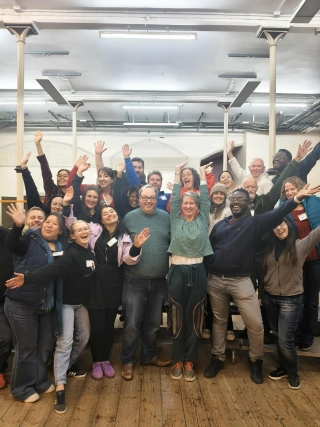In my last post I shared some suggestions to help people develop the musicianship skills needed for singing on the off-beat. The second stage of the process is to consider the music that is asking you to deploy these skills and asking if the composer and/or arranger are facilitating your success or creating obstacles.
You see, off-beat passages are a classic example of the kind of thing a notation program can do really well, as it just produces a literal rendition untroubled by the sense-making that the human brain brings to the process of singing. And whilst sometimes (well, quite often) the problem is patchy musicianship skills in the performers, sometimes the problem is also over-optimism on the part of a writer who hasn’t spent enough of their life in rehearsal trying to help people with patchy skills achieve rhythmic security.
I left you last time with the following exercise, which reproduces the kind of thing you quite often see in a cappella arrangements, and turns out to offer a useful case study to explore this central musical question.







